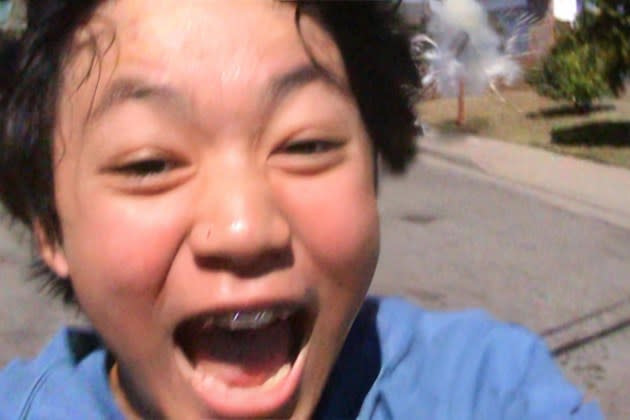‘Dìdi’ Review: 2008-Set Sundance Debut Recalls Being the Kid Brother in an Immigrant Household
- Oops!Something went wrong.Please try again later.
- Oops!Something went wrong.Please try again later.
- Oops!Something went wrong.Please try again later.
- Oops!Something went wrong.Please try again later.
- Oops!Something went wrong.Please try again later.
- Oops!Something went wrong.Please try again later.

Writer-director Sean Wang is tough on himself in “Dìdi,” a fresh and funny summer-before-freshman-year flashback that provides an Asian American angle on that Sundanciest of indie-film genres: the semi-autobiographical coming-of-age movie. In what feels like a cross between Bing Liu’s “Minding the Gap” and Jonah Hill’s “mid90s” — courtesy of the young director’s teenage desire to make skate videos — Wang serves up some of his most wince-inducing adolescent memories, from an aborted first kiss to the realization that he’d been trying to downplay his Taiwanese heritage.
Hacky creative writing coaches are always insisting, “Write what you know.” And yet, when the result comes out as specific and self-effacing as Wang’s Fremont, Calif.-set time capsule, it’s hard to improve on that advice. As Wang reminds, the year 2008 (which also saw the financial crisis in precipitous fall) found thousands of teens making the transition from MySpace to Facebook — both platforms where people could curate which aspects of their identities they wanted to share with the world. In a sense, that quandary defines Wang’s fictional counterpart, played by promising young actor Izaac Wang with a chili-bowl haircut, braces and a faceful of acne.
More from Variety
'Sue Bird: In the Clutch' Documentary Lands With Wolfe Releasing After Sundance Launch (EXCLUSIVE)
Sundance Drama 'Girls Will Be Girls' Sells to Juno Films (EXCLUSIVE)
In Mandarin, “Dìdi” can mean both “little brother” and a term of endearment for a family’s youngest son. It’s a nickname that Wang knows well, though his on-screen proxy, Chris, tends to cringe whenever it’s spoken. To his friends at school — two fellow dorks named Fahad (Raul Dial) and “Soup” (Aaron Chang) — Chris has always been “Wang-Wang.” And yet, there’s an interesting moment (several of them, actually) when he meets someone new and hesitates before deciding how to introduce himself.
Though he’s still a child in many ways — as evidenced by the exploding squirrel he stuffs in a neighbor’s mailbox for the “Jackass”-style opening stunt — Wang-Wang has hit the age where girls start to look interesting. These days, he has his eye on Madi (Mahaela Park). She’s older, taller and half-Asian, a label Wang-Wang disingenuously adopts for himself, even though both of his parents hail from Taiwan.
To impress Madi, Wang-Wang looks up all the things she likes on MySpace and adapts his T-shirt and ringtone to match, trying to give the impression that he shares her taste. Madi nearly calls his bluff when Wang-Wang claims to love one of her favorite movies, the Nicholas Sparks weepie “A Walk to Remember.” He’s happy to let her think that he’s not like the other guys — even if “Dìdi’s” appeal has everything to do with the balance between the universal and the unique in Wang’s experience.
While the specifics of his immigrant upbringing set him apart from many kids, so many Americans can relate to speaking one language at home and another in school, as well as to the stigma of sticking out in a community that otherizes anyone who looks, speaks or acts different. Wang-Wang’s answer is to scrub aspects of his home life from the persona he adopts around his peers. While he signs up for tutoring classes in an Asian family friend’s garage, Wang-Wang finds himself gravitating to a new group of cool kids he sees skating around Fremont. Behind the camera, Sean Wang’s directorial style has flair, which makes it doubly amusing to see his fictional counterpart (who calls himself “Chris” around the skaters) researching how to make videos online.
At home, Wang-Wang’s dad is always away on business, while his mom (Joan Chen) has no choice but to stay back and raise the kids. She’s also stuck dealing with her handful of a mother-in-law, Nǎi Nai (Chang Li Hua), who joins a long line of Asian elders (like “Minari” matriarch Youn Yuh-jung) to imprint themselves on our hearts (except that here, the role is played by Wang’s real-life grandmother). Both Wang-Wang and his college-bound big sister, Vivian (Shirley Chen), adore Nǎi Nai, though “Dìdi” proves perceptive enough to recognize that the nitpicky older woman makes their mom’s life unbearable. (Like the mom in Anthony Shim’s recent “Riceboy Sleeps,” Chen is the low-key soul of the movie.)
Practically beat for beat, “Dìdi” mirrors a million teen movies that have come before, as Wang puts his personal spin on moments that regularly feature in comedies like “Superbad,” “Booksmart” and “The Perks of Being a Wallflower.” There’s the obligatory scene where Wang-Wang shows up at a house party, the youngest kid in the room, and marvels at strangers making out and getting drunk around him. And there are sharper-in-hindsight moments when his lifelong friendships with Fahad and Soup are put to the test.
Wang does a nice job of balancing his naturally comedic sensibility with serious insights into how he triangulated his own identity at Wang-Wang’s age. Still relatively original in the overcrowded teen-movie genre, “Dìdi” proves an effective calling card. Thanks to Netflix, which proactively develops YA projects with directors from diverse backgrounds (including “To All the Boys I’ve Loved Before,” “Tigertail” and “The Half of It”), this cultural milieu isn’t as uncharted as it once was. Still, we’ve come a long way since John Hughes hatched the Long Duk Dong character in “Sixteen Candles.” It feels good to be laughing with kids like Wang-Wang for a change. Vulnerable and honest, Wang sees himself in the character, and so do we.
Best of Variety
Sign up for Variety’s Newsletter. For the latest news, follow us on Facebook, Twitter, and Instagram.
